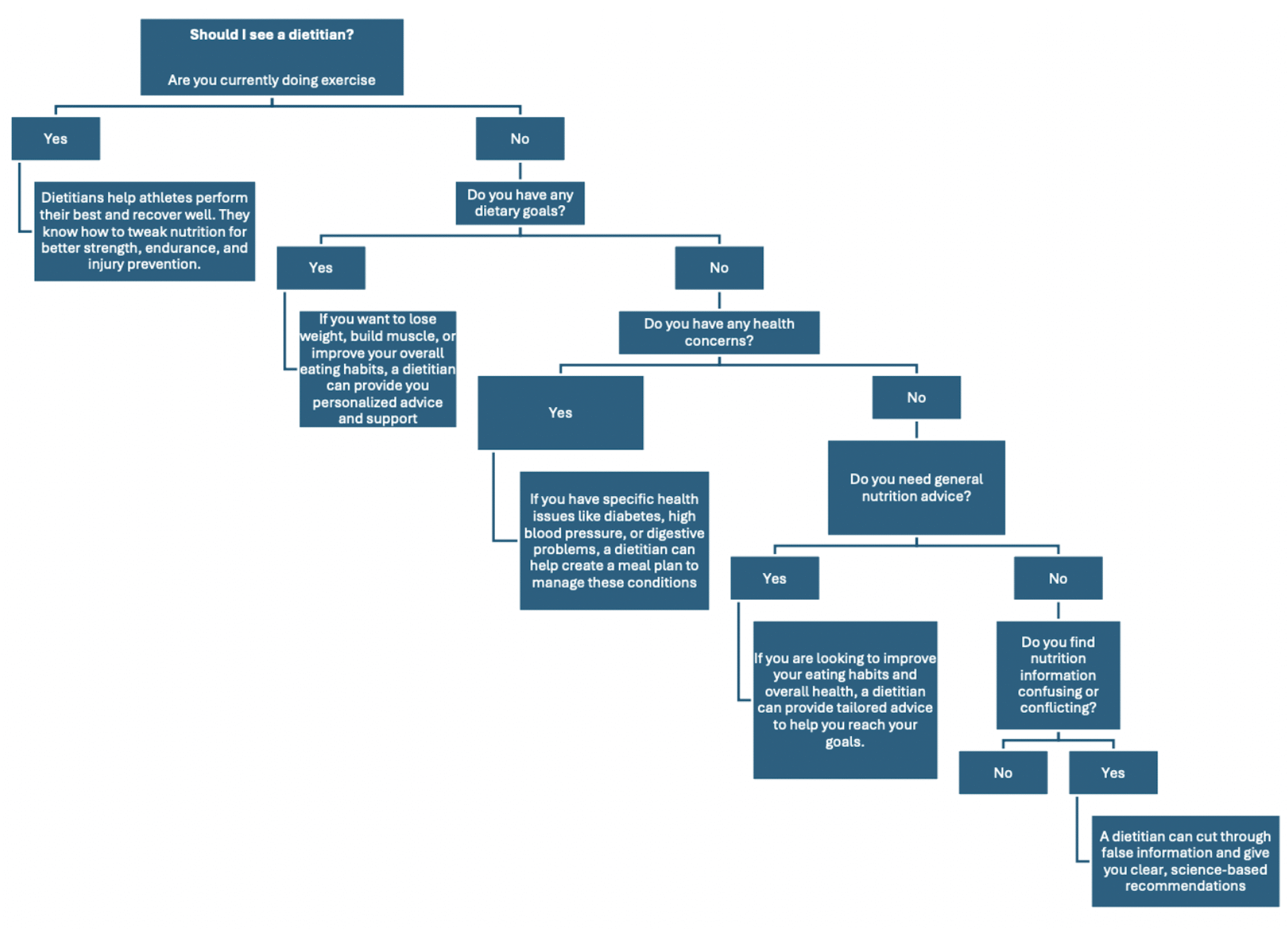
Staying healthy can be a challenge in today’s world, but it’s easily overcome with the right team in your corner. Dietitians are key players in helping many South Africans maintain healthy lifestyles.
A skilled dietitian is more than just a guide for healthier eating; they’re your partner on the journey towards better health. They can help you achieve lasting results through personalised goal setting, support in lifestyle changes, and accountability. Meet them halfway with open communication and a willingness to embrace new habits, and you’ve got a recipe for success.

We spoke to Ashleigh Solomon, a passionate and experienced dietitian who is committed to helping people lead healthier lives. With a Bachelor’s Degree in Dietetics (HONS) from the University of Pretoria and registered with the Health Professions Council of South Africa (HPCSA), Ashleigh has dedicated over six years to her practice, Ash the Dietitian, which she runs in both Johannesburg and Cape Town.
Can I lose weight with a dietitian?
Yes, absolutely! A dietitian is a qualified healthcare professional who understands your body’s nutritional needs. Since weight loss isn’t a one-size-fits-all process, a dietitian can offer personalised advice tailored to your unique needs, medical conditions, preferences, and health goals.
What can a dietitian do?
A dietitian’s goal is to guide you in making informed food choices and developing sustainable eating habits that enhance your overall health and well-being. Since dietitians have various specialisations, choosing one whose expertise aligns with your specific goals is important.
For example, if you have diabetes, finding a dietitian specialising in diabetes management would be the best fit for you.
Some key areas we specialise in include meal planning and recipe development, weight management (both weight loss and gain), sports nutrition, emotional eating, and various medical conditions such as diabetes, high blood pressure, kidney issues, and heart disease. However, our expertise is wider than just these areas, and we tailor our services to meet a wide range of nutritional needs.
What happens when you go to a dietitian?
When you visit a dietitian, you can expect a comprehensive and personalised approach to nutrition and health. Since nutritional needs are unique, the structure of each consultation may look a little different. Here’s an overview of what typically happens:
- Initial Assessment
You’ll begin by discussing your medical history, lifestyle, dietary habits, and any specific health concerns or goals in detail. - Goal Setting
Based on the information gathered, the dietitian will help you set realistic and achievable goals tailored to your needs, whether managing a medical condition, improving athletic performance, or making healthier food choices. - Personalised Plan
The dietitian will create a customised nutrition plan that aligns with your goals. This plan will include meal suggestions, portion sizes, and recommendations for managing your health conditions. - Your personalised plan should help you in understanding your body and nutritional needs.
- Follow-Up Sessions
Regular follow-up appointments may be scheduled to check the sustainability of your new healthy lifestyle, track your progress, adjust your plan, and address any challenges you might face. - Monitoring and Evaluation
The dietitian will monitor your progress through various metrics, such as body composition, blood tests and symptom improvements.
The dietitian’s goal is to give you the knowledge and support needed to make informed decisions about your diet and health.
Who refers you to a dietitian?
Any healthcare professional can refer you to a dietitian. But you can also see a dietitian without an external referral.
Are all dietitians the same?
Not all dietitians are the same – each has their own specialty and way of doing things. Here’s a quick rundown:
- Sports Dietitians
They’re all about helping athletes perform their best and recover well. They can tweak nutrition for better strength, endurance, and injury prevention. - Medical Dietitians
These dietitians focus on using diet to manage health issues like diabetes or kidney problems. They work with patients to create meal plans that support their medical treatment. - Academic Dietitians
They teach or do research, helping to push forward what we know about nutrition. They might be involved in training future dietitians or conducting nutritional research. - Food Service Dietitians
They handle the food side of things in places like hospitals or restaurants. They plan menus, ensure food safety, and keep things running smoothly.
Different dietitians have different approaches, so it’s a good idea to find one who matches your goals and food preferences.
How do I know if I need a dietitian?
Follow the steps in the diagram below to determine if you need to see a dietitian for guidance. If you’re unsure, please reach out to a registered and qualified dietitian online or in person.

How effective are dietitians?
Finding a dietitian who aligns with your goals and philosophies is crucial for a successful partnership.
A good dietitian will help you understand and implement changes and work with you to set realistic and achievable goals based on your preferences and lifestyle.
However, the process relies on your readiness to embrace dietary and lifestyle changes. Being open to altering your daily nutrition habits is key to making progress. This might involve rethinking your current eating patterns, trying new foods, or adopting different meal-planning strategies.
It’s also important to approach these changes with a positive mindset and patience, as lasting change often takes time.
Open communication with your dietitian about your goals, concerns, and feedback will help tailor the plan to your needs and increase your chances of success.
Can a dietitian diagnose obesity?
Yes, absolutely. Dietitians can help you identify if you are obese through several methods:
- BMI Calculation
Calculating your Body Mass Index (BMI), a numerical measure that assesses body weight relative to height, provides a general indication of whether you’re underweight, average weight, overweight, or obese. - Waist Circumference Measurement
They can measure your waist circumference to evaluate abdominal fat, a significant risk factor for obesity-related health issues. - Body Fat Percentage
Dietitians can assess your body fat percentage, which measures the proportion of fat in your body compared to lean muscle mass.
Dietitians can also help you determine whether you are at risk of obesity and recommend appropriate diet and lifestyle changes to prevent it.
How do I know if a dietitian is fully qualified in South Africa?
You can check the following:
- HPCSA Registration
Verify they are registered with the Health Professions Council of South Africa (HPCSA). You can do this on the HPCSA website or by contacting them directly. - Educational Qualifications
Confirm they have a relevant degree in Dietetics from an accredited institution. - Professional Memberships
Check if they are members of professional organisations like the Association for Dietetics in South Africa (ADSA). - Experience and Specialisations
Ask them about their work experience and areas of expertise to ensure they have relevant experience. - References and Reviews
Look for recommendations or read reviews from other clients to assess their reputation. This can often be done on Google via their Google reviews. - Continuing Education
Ensure they participate in ongoing education to stay current with the latest practices. By checking these credentials and qualifications, you can make sure that the dietitian is appropriately qualified and capable of providing professional dietary guidance and support.
How much does it cost to see a dietitian in South Africa?
While dietitians should or charge similar rates, the cost of seeing a dietitian in South Africa can vary based on several factors:
- Fees may differ between larger cities and smaller towns.
- Dietitians with more experience or specialised skills often charge higher fees. For example, a dietitian working with specific conditions in a hospital may charge more than a dietitian working in a health clinic.
- Initial consultations are usually more expensive than follow-up appointments.
- Consultations in which the dietitian is required to perform tests can also cost more.
- Longer sessions or those requiring detailed analysis may cost more.
- If you have medical aid, check whether your plan covers dietitian consultations and the reimbursement rates, as coverage can vary based on your plan and the dietitian’s registration status.
- It’s also important to check if your dietitian submits directly to medical aid or requires upfront payment.
Contact the dietitian directly or visit their website for the most accurate and up-to-date information.
What’s the difference between a nutritionist and a dietitian in South Africa?
Dietitians have formal qualifications and are regulated by a professional body (HPCSA), allowing them to provide medical nutrition therapy.
Nutritionists, however, are not regulated by a professional body. They may have different levels of training and typically focus on general wellness and preventive nutrition.
Nutritionists do not have the training or authority to manage specific medical conditions or provide clinical nutrition therapy.
Do medical aid schemes in South Africa cover dietitians?
Yes, nearly all medical aid schemes in South Africa cover dietitian consultations, but the extent of coverage can vary depending on the plan and provider.
It is important to review your medical aid scheme’s benefits or contact their customer service for detailed information on dietitian coverage to determine the specifics of your medical coverage. Coverage may also vary based on the dietitian’s registration status with the scheme. For the most accurate information, contact the dietitian directly or visit their website for assistance.
Is a dietitian a doctor in South Africa?
No, a dietitian is not a medical doctor in South Africa unless they state that they have studied for and attained a medical degree. At the same time, dietitians and doctors play crucial roles in healthcare, but their training and scope of practice differ.
Dietitians focus on nutrition therapy and dietary management, whereas doctors provide comprehensive medical care and treatment. However, a doctor will often refer you to a dietitian if you require dietary assistance.
What is the difference between a dietitian and a dietician?
They both refer to the same job profession. “Dietician” is the older way of spelling it, while “dietitian” is more commonly used at present.
Working with a dietitian can be a life-changing step toward better health. The key? Being open, ready to try new things, and giving yourself time. A dietitian will help you make realistic, lasting changes that fit your life and goals, making it easier to stick to healthy habits for the long haul.
Book an online dietitian consultation with Virgin Active
Connecting with our experts through the Virgin Active app is simpler than ever. To schedule your virtual dietitian consultation, log into the app, choose your club, and select a health expert.
Ready to begin? Click here to book an online dietitian consultation and join a Virgin Active gym near you today.
